-
An Introduction to Soil Pollution
An Introduction to Soil Pollution in Houston, TX
Soil pollution can have a negative impact on plants, animals, the water table, and other environmental elements. When industrial factories do not practice proper waste management, their byproducts could enter the surrounding soil and cause pollution. With correct industrial waste disposal, it is possible to minimize soil pollution in Houston, TX.
What Is Soil Pollution?
Soil pollution is the contamination of soil by toxic chemicals, pollutants, hazardous waste, or contaminants in high enough concentrations that it poses a risk to human health or the ecosystem. While some contaminants occur naturally in the soil, soil pollution is caused by the introduction of higher levels of contaminants than are naturally present.
What Are the Primary Causes of Soil Pollution?
Understanding soil pollution and its causes can help your company design and implement a comprehensive prevention plan. All soils contain a natural level of contaminants like metal, phosphates, sulfates, nitrates, and organic compounds. If the levels of contamination exceed natural levels, the soil is polluted. The most common causes of soil pollution are anthropogenic and natural. Anthropogenic pollution is caused by man, while natural pollution is caused by wind, rainwater, soil disturbances, and animal activity.
- Natural Pollution – Natural pollution is often caused by rainwater or water runoff, animal activity, wind, erosion, or soil disturbances.
- Man-Made Pollution – Man-made pollution is by far the most common cause of soil pollution. Man-made pollution is caused by improper disposal of chemical and industrial waste, including manufacturing, agricultural, and pharmaceutical processes.
Most Common Types of Soil Pollution in the U.S.
Soil pollution is a combination of contaminants and pollutants. Pollutants can be natural or man-made. Contaminants are the byproducts of pollutants. Man-made pollutants are typically the result of agricultural practices, industrial and chemical manufacturing, or radioactive emissions. The most common types of soil pollution in the U.S. are:
- Biological – Biological pollutants are non-native species introduced to the soil, such as contaminants from living organisms.
- Agricultural – Agricultural pollutants include pesticides, fertilizers, herbicides, insecticides, slurry, debris, and manure.
- Radioactive – Radioactive pollutants include radium, thorium, uranium, and nitrogen.
- Urban – Urban waste includes garbage, dried sludge, sewage, and domestic and commercial waste.
- Industrial and chemical – Industrial and chemical waste is generated by paper mills, oil refineries, mines, factories, petroleum production, and other processes. Pollution includes drugs and pharmaceuticals, hazardous waste, cement, glass, steel, and more.
The most common soil contaminants are:
- Arsenic
- Copper
- Herbicides
- Insecticides
- Lead
- Mercury
- Nickel
- Pesticides
- Polyaromatic Hydrocarbons
- Zinc
Understanding the Effects of Soil Pollution
Soil pollution can cause illness, injury, and death to plants, animals, and humans. Soil pollution can increase the risk of illness or disease and affect the nervous and immune systems. Some of the most serious effects of soil pollution are:
- Health problems like developmental disorders, brain damage, neurological conditions, nervous system conditions, and illness
- Increased risk of certain cancers like leukemia
- Damage to crops
- Water and air pollution if soil pollutants wash into rivers or volatile compounds enter the atmosphere
- Loss of habitats for wildlife and loss of biodiversity
- Degradation of land
- Loss of livelihood and economic downturn
The Connection Between Industrial Waste & Soil Pollution
Industrial waste is one of the leading causes of soil pollution. Industrial chemical waste contains toxins and hazardous materials that can contaminate soil, such as lead, zinc, cadmium, arsenic, and mercury. If industrial waste is not properly disposed of or if it leaks from buildings, trucks, or storage containers, it can cause soil pollution, water pollution, and air pollution. It’s crucial to have a comprehensive industrial waste management program in place at any facility that generates industrial chemical waste.
Preventing Soil Pollution
The most effective way to prevent soil pollution is to properly dispose of, recycle, or reuse chemicals or industrial byproducts. You can also reduce the use of certain contaminants like pesticides, insecticides, herbicides, and fertilizers. Some crucial ways you can prevent soil pollution are:
- Reusing or recycling plastics, chemicals, and metals when possible
- Properly disposing of hazardous and non-hazardous waste
- Composting organic waste
- Storing chemicals, fertilizers, pesticides, herbicides, and manure properly
- Using biodegradable and eco-friendly products
- Using soil remediation services if you become aware of a spill or soil pollution
Learn More About Soil Pollution and Remediation Solutions
When you are seeking top-quality industrial waste disposal services or soil remediation services in Houston, TX, look no further than Excel Industrial Group, LLC. Our company can assist you with all of your industrial waste disposal needs, and we will make sure that your waste disposal methods are not causing pollution. To book a consultation with a waste analysis professional, call or contact us online.
-
What Are the Dangers of Lead Exposure?
What Are the Dangers of Lead in Houston, TX?
Lead is a naturally occurring element that is found in the earth. It has some beneficial uses and can be found in gasoline, paint, plumbing pipes, ceramics, batteries, and more. If lead was once used to manufacture so many different products, why is lead exposure dangerous? Lead exposure can cause serious health problems for humans and animals. In high enough levels, lead poisoning can cause seizures, coma, or death. Excel Industrial Group is here to expose the dangers of lead in Houston, TX.
What Is Lead Exposure?
Lead exposure occurs when a person or animal inhales lead powder, dust, or fumes or ingests lead through their mouth or skin due to contaminated food or water, lead on clothing or other surfaces, or cigarettes. Children are more likely to be exposed to lead because they put their fingers and objects in their mouths. They may also develop lead exposure from eating soil or lead paint. Adults can be exposed to lead through their jobs or hobbies. Lead poisoning occurs when high levels of lead build up in the body, typically over months or years. Even small amounts of lead can cause problems, especially in children under six.
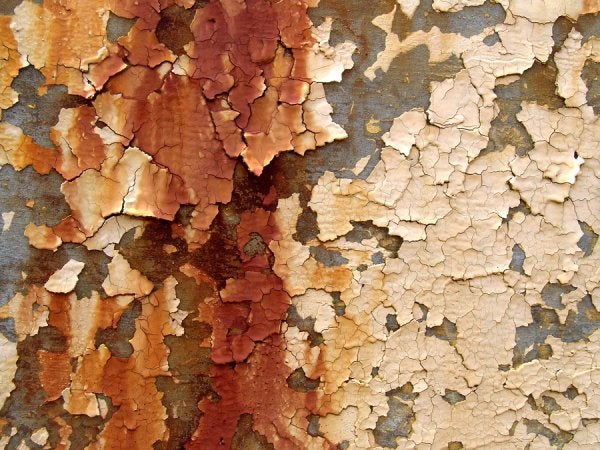
Understanding the Dangers of Lead Exposure
There is no safe level of lead exposure for young children. Even at low levels, lead exposure can cause illness, mental and physical disabilities, developmental issues, muscle pain, fatigue, loss of appetite, headaches, and stomach cramps. Lead poisoning or high levels of lead exposure can be deadly. The most common complications of lead exposure are:
- Developmental disorders and growth delays
- Cardiovascular problems
- Seizures
- Kidney disease
- Anemia
- Brain damage
- Nervous system disorders
- Reproductive health issues
- Chronic pain
Being Aware of Common Causes of Lead Exposure
Children and adults can come into contact with lead via contaminated air, soil, water, and food. You can also be exposed to lead through batteries, gasoline, or lead paint. The most common causes of lead exposure are:
- Paint
- Batteries
- Solder
- Pipes
- Pottery
- Roofing materials
- Imported cosmetics
- Water pipes
- Plumbing fixtures
- Copper pipes
- Food cans
- Imported goods
- Soil
- Household dust
- Imported toys
- Herbal or folk medicines
- Mexican candy
- Chocolate
- Bullets
Risk Factors for Lead Exposure
You may be more likely to be exposed to lead due to your age, environment, or occupation. The most common risk factors for lead exposure include:
- Age – Young children are more likely to be exposed to lead.
- Environment – People who live in older homes may be exposed to lead paint. You may also live or work in an older building that has contaminated soil or water.
- Hobbies or Job – You may be more likely to be exposed to lead if you work with lead-based products, such as those used in furniture refinishing, making stained glass, working with batteries, construction, and radiator repair.
- Use of Imported Goods – If you regularly use products from certain countries with less stringent manufacturing regulations, you may purchase food, cosmetics, supplements, medications, toys, jewelry, or other products that contain lead.
Lead Exposure Symptoms
Lead poisoning symptoms are different in infants, children, and adults. The most common symptoms of lead exposure in infants are:
- Premature birth
- Low birth rate
- Slowed growth
The most common symptoms of lead poisoning or exposure in children are:
- Developmental and growth delays
- Learning difficulties
- Loss of appetite or weight loss
- Fatigue
- Irritability and mood swings
- Abdominal pain, vomiting, or constipation
- Hearing problems
- Vision problems
- Seizures
The most common symptoms of lead exposure or lead poisoning in adults are:
- High blood pressure
- Cardiovascular problems
- Kidney problems
- Headaches
- Memory and concentration issues
- Joint and muscle pain
- Mood disorders
- Fertility problems
- Miscarriage, stillbirth, or premature birth
What to Do if You Recognize Symptoms of Lead Poisoning
If you think you or your child has been exposed to lead, you should call 911 or make an appointment with your doctor right away. If you aren’t sure if a product you’ve used or been in contact with contains lead, you should call the National Poison Control Hotline.
Why Choose Excel Industrial Group
At Excel Industrial Group, we specialize in environmental cleanup services, including contamination spill services, soil remediation, excavation of contaminated soil, onsite soil solutions, environmental assessments, onsite sampling and testing, and waste analysis. If you suspect you have lead on your property, our team will respond quickly to assess the paint, soil, water, or other materials and determine if there is a threat. If we do find evidence of lead contamination, we offer lead remediation and waste management solutions. We have over 25 years of experience in hazardous waste disposal and are committed to providing efficient, safe, and cost-effective solutions.
Learn More About Lead Abatement & Chemical Waste Management
Proper waste management can help you avoid the effects of lead exposure and keep your family protected. Please do not hesitate to call Excel Industrial Group now or contact us online to learn about our chemical trading and lead abatement services.
-
What Is Chemical Repurposing?
Chemical Repurposing in Houston, TX: What You Need to Know
Chemical waste management is a crucial part of manufacturing and industrial processes in Houston, TX. When chemicals are reused or repurposed rather than being sent to landfills, we can reduce our environmental footprint, save money, and prevent chemicals from going to waste. During the chemical repurposing process, chemical materials are evaluated for volume, safety, and viability to determine if they qualify for possible reuse. Excel Industrial Group can facilitate this process by analyzing your chemical and industrial waste, telling you how it can be repurposed, and connecting you with the right buyers or chemical traders. We will then safely remove and transport your chemicals to the new owner.

What Is Chemical Waste?
Chemical waste is any unused, unwanted, or leftover chemical material. Chemical waste can be classified as hazardous waste, non-hazardous waste, universal waste, or household hazardous waste. The rules and regulations surrounding how to handle, store, transport, and dispose of chemical waste depend on the type and amount of waste. Industrial waste is any waste produced by industrial activity that is no longer useful. It can be hazardous or non-hazardous and can be in solid, liquid, or gas form. Chemical and industrial waste can be generated by:
- Manufacturing
- Mining
- Mills
- Factories
- Textile and leather production
- Food processing
- Power plants
- Electronics manufacturing
- Construction and demolition
- Waste treatment and disposal facilities
- Cleaning companies
- Households/consumers
What Is Chemical Repurposing?
If chemical materials are still viable, they can be reused so they don’t end up in a chemical waste disposal facility. Ideal chemicals are ones that are unopened, unexpired, mostly full, and uncontaminated. The containers holding the chemicals must be in good condition and must contain the original manufacturer’s labels. Chemical waste repurposing may be possible for:
- Acids
- Alkalis
- Acetone
- Batteries
- Ethanol SDA
- Ethyl acetate
- Ethylene glycol
- Ferrous sulfate
- Glycols
- Hydrofluoric acid
- Methyl ethyl ketone
- Isopropyl Alcohol
- Metals like lead and aluminum
- Phosphoric acid
- Plastics
- Sodium hydroxide solution
- Solvents
- Some industrial byproducts
- Sulfuric acid
Repurposed chemicals can be used in many different ways:
- Scented fragrances used in shampoo can be repurposed for creating perfume.
- Mineral oil used by drug companies can be repurposed to make insect repellent.
- Isopropyl alcohol used in medical devices can be repurposed by printing companies.
- Surplus vitamins can be reused in water treatment plants.
Why Is Chemical Repurposing Necessary?
To reduce our environmental impact and limit the introduction of non-hazardous and hazardous chemicals into landfills and waste disposal facilities, we should commit to sustainable practices in an effort to create a circular economy. Some chemicals can be recirculated and reused, such as pharmaceuticals, pesticides, and surfactants. Chemical repurposing can save money, reduce environmental impact, and reduce the amount of chemical waste that ends up in chemical waste management facilities. The benefits of repurposing industrial waste and chemical waste are:
- Turn your unused chemical and industrial waste into an additional income stream for your company.
- Help you find a safe, environmentally friendly way to dispose of your chemicals.
- Reduce your environmental impact and make your company greener.
- Reduce your need for chemical waste disposal services.
- Save resources and money used to manufacture new chemicals.
- Keeps potentially hazardous chemicals out of landfills.
- Conserves natural resources.
How to Repurpose Waste from Chemical & Industrial Processes
Chemical waste management is crucial, as chemical and industrial waste can be hazardous and dangerous to the environment. Repurposing chemical waste keeps it out of landfills and allows it to find a second life. If the chemicals are viable, a chemical and industrial waste management company can connect you with a chemical trader or buyer. That company will negotiate a price, and the waste management company will arrange for the safe transportation of your chemicals to their new owner. Before chemicals can be repurposed, they must go through a stringent process:
- Analysis of Chemical Purity – The chemicals must be analyzed to determine if they are of sufficient purity for their new application.
- Established Efficacy or Viability – The chemicals must be tested to ensure they are still effective and viable.
- Safety – The chemicals must be proven to be safe, not contaminated or tampered with, and in a container that is in good condition.
- Properly Labeled – The chemicals must be properly labeled by their original manufacturer.
Why Choose Excel Industrial Group
If you are involved in a business that creates chemical industrial waste, it is essential that you have a waste management plan that complies with all local and federal regulations. Industrial waste can be chemical in nature and may be hazardous. Storing or disposing of unwanted industrial chemicals can create environmental hazards, but chemical waste can be kept out of landfills through chemical repurposing. With our chemical trading services, we can find buyers for your used or unwanted chemicals. Not only does this benefit the environment, but it can translate into extra income for your company. Acids, alkalis, and solvents are just a few of the types of chemicals that can be repurposed and used across different industries.
Contact Us for Chemical Waste Management Solutions
At Excel Industrial Group, we can help you turn potential waste into valuable resources for your company. We specialize in chemical waste management services, industrial waste transportation and disposal, waste analysis services, chemical waste transportation, and chemical trading. Call us now or contact us online to learn more.
-
What Is Asbestos?
Certified Asbestos Abatement in Houston, TX
Asbestos is a hazardous material commonly found in industrial establishments and was formerly a preferred construction solution. It is linked to a wide range of health risks, raising the importance of effective removal. To satisfy these critical procedures, Excel Industrial Group provides full-service asbestos abatement services in Houston, TX.
What Is Asbestos?
Once regarded for its versatility and affordability, asbestos is now known to be problematic. Derived from soil and rock, asbestos consists of six natural minerals characterized by thin, fibrous crystals that cannot be detected by the naked eye. The resiliency of asbestos fibers made it a popular industrial building material in the 20th century.
The History of Asbestos in the United States
Asbestos was formerly a premier choice for product fabrication because of its extended durability, fire resistance, insulating properties, and affordable price point. However, modern research discovered that along with its redeeming qualities, asbestos was also extremely toxic. This caused the induction of stringent asbestos regulations in the 1980s.
The Reality of Asbestos Exposure
While there are regulations surrounding the use of asbestos in the United States, this problematic mineral is not entirely banned. Moreover, the risk of asbestos exposure remains a very real concern. Many older commercial and industrial facilities still feature some form of asbestos product.
Types of Asbestos
Asbestos is a term that covers various forms of asbestos products used in commercial and industrial applications. There are two categories of asbestos, amphibole and serpentine, and six types of asbestos. The amphibole family refers to five forms of asbestos: actinolite, amosite, anthophyllite, crocidolite, and tremolite, whereas the serpentine asbestos family is defined solely by chrysotile.
Chrysotile
Chrysotile, also known as white asbestos, is the only member of the serpentine asbestos family and the most widely used type of asbestos. With superior insulation and fire-proofing properties, chrysotile was favored for construction, accounting for 90-95% of all building asbestos in the United States.
Actinolite
Actinolite asbestos is a darker-colored mineral in the amphibole family. This type of asbestos was commonly used in the manufacturing of cement, paint, drywall, sealants, and insulation products.
Amosite
Amosite, also known as brown asbestos, is an amphibole mineral. It is the second most popular form of asbestos, accounting for approximately 5% of all asbestos used in America. Brown asbestos is typically associated with insulation, tiles, and gaskets.
Anthophyllite
Anthophyllite asbestos is another type of amphibole asbestos. Ranging from yellow to brown, anthophyllite was seldom used for consumer applications. However, it has been found in certain types of insulation and cement products.
Crocidolite
Crocidolite is an amphibole asbestos commonly referred to as blue asbestos. Crocidolite offers reduced heat resistance, so it is far less sought-after than alternative asbestos types. Applications that may contain blue asbestos include tile, insulation, and cement products.
Tremolite
Tremolite is the fifth and final member of the amphibole family. Its color varies from cloudy white to dark green. Tremolite is associated with plumbing materials, paint, and sealing agents.
Risk Categories of Asbestos Products
Asbestos products are classified as friable or non-friable. These classifications indicate the exposure risk of the material. Asbestos products that crumble into a powdery substance when manipulated by hand are known as friable. Non-friable products refer to asbestos fibers contained within a solid material. Friable asbestos products are associated with higher risks than non-friable products.
The Health Risks Associated with Asbestos
Both short- and long-term exposure to asbestos are linked to certain asbestos-related illnesses. Inhaling or ingesting asbestos fibers contributes to a prolonged latency period and gradual development of numerous health conditions, including:
- Laryngeal cancer
- Lung cancer
- Ovarian cancer
- Mesothelioma (cancer of vital organ lining)
- Asbestosis (chronic lung disease)
- Pleural thickening
- Pleural plaques
How to Test for Asbestos
If you suspect the presence of asbestos, it’s imperative to seek professional intervention. Asbestos cannot be simply removed. Demolition or renovation procedures pose the risk of aggravating the asbestos, elevating the likelihood of hazardous exposure. To protect your business and employees, look to our Excel Industrial Group’s certified waste management team.
How to Safely Handle Asbestos Removal
Asbestos abatement is a multistep procedure used to remove asbestos-containing materials. To limit exposure risks, asbestos abatement includes:
- Assessment to detect and test asbestos materials
- Containment to mitigate the risk of airborne asbestos fibers
- Asbestos removal using specialized equipment and detachment techniques
- Compliant hazardous waste disposal procedure
Asbestos Abatement with Excel Industrial Group
We recognize the dangers of improper asbestos abatement. To minimize exposure and restore the safety of your property, we employ a meticulous asbestos abatement process that adheres to all applicable local, state, and federal regulations. With years of expertise and industrial-grade equipment, trust in our experts for effective asbestos and hazardous materials management.
Contact Us for Asbestos & Hazardous Materials Management
When you let our waste management professionals handle your asbestos removal, you avoid unnecessary risks. Partner with our certified team for high-quality site assessments, asbestos, and hazardous materials management services in Houston, TX. For more information or to schedule an inspection, contact Excel Industrial Group today.
-
The Basics of Chemical Recycling
The Basics of Chemical Recycling in Houston, TX
Chemical waste is a byproduct of many different industrial manufacturing processes. If your company disposes of large quantities of chemicals throughout the workweek, it may be time to explore chemical recycling options. For safe and effective solutions tailored to your operational demands, look to Excel Industrial Group in Houston, TX.
What Is Chemical Recycling?
Chemical recycling involves safely disposing of excess chemicals in a way that enables the materials to be reused or repurposed. In contrast to mechanical recycling procedures, chemical recycling does not simply reshape the materials. Working at a molecular level, chemical recycling breaks down waste and restores chemicals to their inherent form or subsequent useable materials.
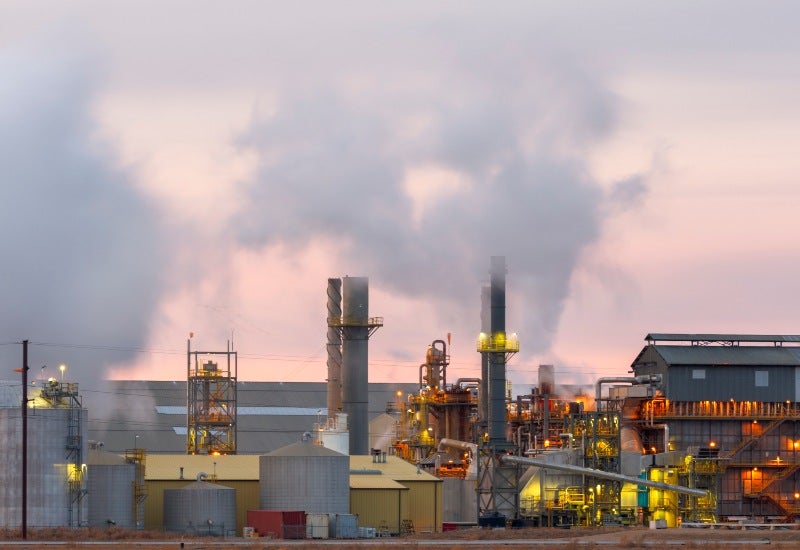
The Significance of Chemical Recycling
Certain plastics are historically challenging in terms of proper disposal practices. Traditional mechanical recycling methods cannot be used for contaminated plastic waste and/or mixed-polymer waste streams. These subsets of plastic waste account for the majority of all plastic waste streams, raising the importance of incorporating effective chemical recycling procedures into your industrial operations.
The Benefits of Chemical Recycling
There is no substitute for effective chemical recycling. These tailored procedures are linked to many benefits, including:
- Reduced volume of landfill waste
- Natural resource conservation
- Greater sustainability, contributing towards a circular economy
- Minimize greenhouse gas and CO2 emissions
- Recycle and repurpose plastic waste that cannot be handled through mechanical recycling
Sulfuric Acid Recycling
Sulfuric acid is a chemical used in many industries. To recycle it, a processing plant must dilute and evaporate the liquid acid to produce a sulfur trioxide concentrate. The concentrate can then be reused for various applications.
Hydrochloric Acid Recycling
The operations of industrial manufacturing plants that work with steel materials often feature hydrochloric acid. Hydrochloric acid can easily be treated and recycled once it has been used to purify steel. Pyrohydrolysis is the chemical recycling process for hydrochloric acid. This process involves concentration and evaporation procedures to separate the used acid into iron chloride components.
Chemical Recycling of Packing Materials
Polymers are large molecules that make up the chemical structure of various plastic products, including packing materials. Polymers have the potential to be reused for a wide range of applications. However, they are notoriously challenging to dispose of as they cannot be treated using conventional recycling procedures.
What Does Chemical Recycling of Packaging Materials Involve?
Plastic packaging materials account for the world’s largest waste stream. To minimize environmental impact and promote sustainable efforts across varying industrial sectors, chemical recycling processes are encouraged for contaminated and/or complex plastic packaging materials. These recycling demands commonly involve depolymerization achieved through a process called hydrolysis.
Depolymerization for Polymer Plastic Waste
Depolymerization is the primary method used to recycle and decompose contaminated or complex plastic packing materials. Depolymerization blends solvents, heat, and chemistry to break down polymers into their inherent monomer form (smaller molecules). Subsequent depolymerization and chemical recycling procedures include glycolysis, aminolysis, and alcoholysis.
Choose Excel Industrial Group
With decades of expertise, state-of-the-art equipment, and the resources to satisfy a wide spectrum of industrial demands, Excel Industrial Group sets the standard for non-hazardous and hazardous chemical recycling and chemical trading services. With a commitment to sustainability, trust in our certified experts for safe, effective, and compliant waste management solutions that align with your business.
Contact Us for Chemical Recycling Solutions
Excel Industrial Group is proud to be a premier choice for industrial waste disposal and recycling. Entrust your waste management efforts to our full-service non-hazardous and hazardous chemical waste recycling services in Houston, TX. For more information about our acid waste disposal, recycling, and chemical trading services, contact our team today.
-
What You Should Know About Chemical Trading
The Chemical Trading Business in Houston, TX
Turn your company’s chemical waste into profit with Excel Industrial Group. Our experts specialize in chemical trading services for industrial facilities across Houston, TX, and the United States. If you’re new to the chemical trading business, we’ve compiled a collection of frequently asked questions to get you started.
What Is Chemical Trading?
Chemical trading is a standard business practice involving the handling and repurposing of industrial chemicals. This sustainable practice can be used to account for excess chemicals that will otherwise be deemed as unavoidable hazardous waste. With the proper trade partners and logistics, chemical trading is an excellent way to repurpose chemicals and recoup losses.
Important Facts About the Trading of Chemicals
Chemical trading may seem simple in theory. However, this fast-paced and competitive industry can be challenging to navigate without the proper guidance. To get you started on the right track, Excel Industrial Group is here to explore important facts and the ins and outs of chemical material trading.
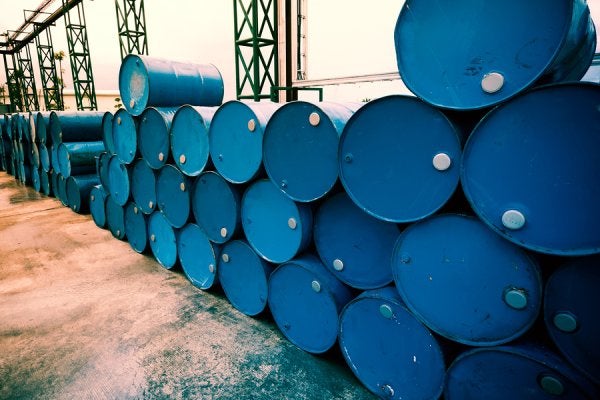
Prioritize Constant & Efficient Waste Management
Repurposing industrial waste is not something a business can do haphazardly. The chemical trading business relies on a well-developed plan to ensure proper handling of industrial waste disposal. Constant and efficient waste management is a critical investment to sustain smooth operations, prevent backups, remove waste, and boost profit.
How to Start Trading in Chemicals – The Basics
Venturing into the world of chemical trading requires proactive preparation. First, you will need to examine the volume and type of chemicals you intend to trade. A waste management team may be willing to pay you for extra chemicals you may have, even if they are contaminated or distressed.
Common Chemical Material Trading Products
We are well-versed in the most in-demand chemical trading products. The most commonly bought and traded chemicals include:
- Acids – Sulfuric, hydrochloric, etc.
- Solvents – Acetone, hexane, etc.
- Fuels – Motor oil, gasoline, etc.
- Alcohols – Ethanol, methanol, etc.
- Alkali – Potassium, hydroxide, etc.
- Glycols – Antifreeze, etc.
- Metals – Cobalt, nickel, etc.
- Polymers – PP, PET, etc.
- Monomers – Propylene, etc.
Find the Right Chemical Trading Partner
Chemical trading is a regulated practice, making it crucial to partner with a legitimate business that understands and adheres to the rules. The right partner will have valuable connections and working knowledge of the market. It’s also important to choose a partner equipped to handle the volume and type of chemicals you intend to trade.
Important Chemical Trading Terms
The chemical trading sector has its own language. There are several commonly used terms that you must get familiar with before branching into the industry, including:
- Incoterms – Freight on board (FOB), cost insurance freight (CIF), Cost and Freight (CFR)
- Payment terms – Direct payment (DP) and telegraphic transfer (TT)
- Port of loading/discharge names
Chemical Trading Coordination & Logistics
Depending on the volume and type of chemicals you’re seeking to trade, profit margins may be as little as 5%. To avoid spending more than you’re bring in, it’s essential to be strategic about your logistics planning. Proper packing and efficient trade route planning play a pivotal role in your total landed cost (TLC).
Tips for First-Time Chemical Traders
First-time chemical traders may be overwhelmed by the concept. To empower your latest business venture, we’re here to guide you. Before getting started, there are three key factors to consider, including:
- Get familiar with influential market factors
- Identify your company’s competitive edge
- Research and master import/export regulations
Influential Market Factors
Successful trading in chemicals requires understanding the market. When getting started in the chemical trading sector, it’s important to regularly assess the current trade volumes, prices, and logistics costs. These factors enable you to consider whether it would be more cost-effective for your partner to source a new supplier or to seek an alternative material.
What Sets You Apart
To get ahead of the competition, identify your competitive edge. We recommend asking yourself the following questions:
- Why should companies do business with you instead of a larger/international company?
- Do you offer a specialty, hard-to-source chemical?
- Are you offering surplus chemicals at a better rate than the competition?
- How convenient are the logistics of your transaction?
Always Do Your Research
The chemical trading sector is subject to many compliance standards and regulations. To streamline your transactions, always do your research. If the company looking to buy your excess chemicals is located in another country, do your homework on existing import and export guidelines for your particular industry.
Your Knowledgeable Chemical Trading Partner
Not all companies are equipped or experienced enough to provide proper disposal and storage, but Excel Industrial Group is. With a vast knowledge of industrial chemicals, we know which ones are likely to be repurposed or salvaged. Moreover, we excel in safe handling and proper disposal practices even if your excess chemicals cannot be traded.
Choose Excel Industrial Group
Excel Industrial Group sets the standard for effective chemical trading solutions. We ensure unused chemicals are processed in compliance with local, state, and federal regulations and handled in the safest, most environmentally friendly manner. With an extensive network of resources and potential buyers, we maximize the value of chemicals that would otherwise be deemed hazardous waste.
Contact Us for High-Value Chemical Trading Solutions
If you’re interested in the chemical trading business, you’ve come to the right place. Excel Industrial Group is here to help you master your role as a chemical trader and supercharge your profit. To learn more about the benefits of chemical trading, contact our team today.
-
Understanding the Different Types of Waste Streams
Different Types of Waste Streams
It’s important to effectively manage waste in order to maintain a clean, safe environment and promote sustainable practices. A significant aspect of this management is understanding waste streams—distinct types of waste that originate from various sources and require specific handling methods. Whether you’re a business, municipality, or industrial facility, comprehending the characteristics and types of waste streams is essential to making informed decisions about disposal, recycling, and overall waste management.
What is a Waste Stream?
A waste stream refers to the complete flow of waste from its source through to its disposal. It encompasses all the steps, from the generation of waste, collection, and transportation, to its eventual processing and disposal. Each waste stream contains materials that require different management methods to ensure they are handled safely, efficiently, and in compliance with environmental regulations.
Characteristics of Waste Streams
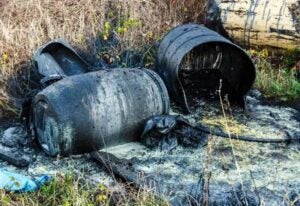
Waste streams can vary significantly depending on their origin and the materials they contain. Key characteristics include:
- Composition: Waste streams consist of various materials, such as organic matter, plastics, metals, or chemicals, each requiring different treatment methods.
- Source: The origin of waste, whether it be industrial, municipal, or agricultural, defines the waste stream’s characteristics and disposal needs.
- Volume: The quantity of waste generated plays a role in determining the appropriate management strategy, with larger volumes often requiring more complex handling processes.
- Hazard Level: Some waste streams contain hazardous materials, necessitating specialized disposal to protect human health and the environment.
Types of Waste Streams
Waste streams can be broadly classified into several categories, each with unique management requirements:
- Municipal Solid Waste Stream (MSW): This includes everyday items discarded by households and businesses, such as food waste, packaging, and paper products. Proper sorting and recycling are crucial for managing this waste stream effectively.
- Industrial and Commercial Waste Streams: Generated by manufacturing and production activities, these waste streams can include a wide range of materials, from scrap metals to chemical byproducts. Managing industrial waste streams often involves more stringent regulations due to the potential environmental impact.
- Hazardous Waste Streams: Containing materials that pose significant risks to health and the environment, hazardous waste streams must be managed with extreme care. This category includes items like toxic chemicals, batteries, and medical waste.
- Liquid Waste Streams: Comprising wastewater and other liquid residues, these waste streams often require treatment before disposal to prevent contamination of water bodies. Industries and municipalities must manage liquid waste streams effectively to protect water quality.
- Non-Hazardous Waste Streams: These include materials that are not an immediate threat to health or the environment, such as certain types of industrial waste, construction debris, and agricultural waste. While less dangerous, proper management is still vital to minimize environmental impact.
- Construction and Demolition (C&D) Waste Streams: Construction and demolition activities generate significant waste streams composed of materials like concrete, wood, metals, bricks, and glass. These waste streams can also include hazardous components such as asbestos, lead-based paints, or treated wood. Managing C&D waste streams involves sorting and recycling materials to minimize landfill use, reduce environmental impact, and comply with regulations. Proper management of these streams is essential for promoting sustainability in the construction industry while reducing costs associated with waste disposal.
The Importance of Understanding Different Types of Waste Streams
Recognizing and categorizing different types of waste streams is essential for several reasons:
- Environmental Protection: Proper waste stream management helps reduce pollution, conserve resources, and protect ecosystems. For example, separating recyclable materials from solid waste streams ensures they are reused, reducing the strain on natural resources.
- Regulatory Compliance: It’s important to adhere to local, state, and federal regulations regarding waste management to avoid penalties and ensure safe disposal practices. This is especially important for managing hazardous waste streams, which are subject to strict regulations.
- Cost Efficiency: Effective waste management can reduce disposal costs, enhance resource recovery, and even generate revenue through recycling programs. Understanding the types of waste streams your business produces allows you to implement more efficient and cost-effective management practices.
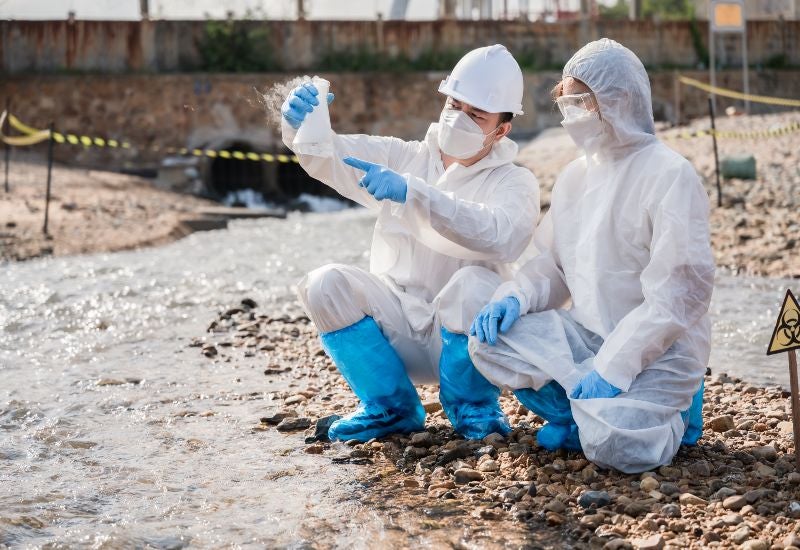
Difference Between Non-Hazardous & Hazardous Waste Streams
The primary difference between non-hazardous and hazardous waste streams lies in their potential risk to health and the environment. Hazardous waste streams contain toxic, reactive, corrosive, or flammable materials that require specialized handling and disposal. In contrast, non-hazardous waste streams, while still needing proper management, do not pose the same level of risk. Managing hazardous waste streams is more complex and costly, but it is essential for ensuring safety and regulatory compliance.
Why Choose Excel Industrial Group in Houston, TX?
Excel Industrial Group is a leader in waste management services with over 25 years of experience, specializing in both hazardous and non-hazardous waste streams. We understand the complexities involved in managing different types of waste and offer tailored solutions that prioritize safety, compliance, and cost-efficiency. Our expertise extends across all waste types, ensuring your business remains compliant with regulations while minimizing environmental impact. Located in Houston, TX, we provide local businesses with the support they need to manage waste effectively and responsibly.
Contact Us for All Your Waste Solutions in Houston, TX
If you’re looking for reliable and efficient waste management services, Excel Industrial Group is here to help. Our team is ready to provide you with the expert guidance and service you require. Ready to take control of your waste management? Fill out our contact form or call us today to speak with our professional team about your waste solutions in Houston, TX, and learn how we can assist in managing your waste.
-
Characteristics of Hazardous Waste
Evaluating Characteristics of Hazardous Waste
Hazardous waste is an issue that demands attention from every industry, large or small. Properly handling and disposing of hazardous waste is crucial to protecting the environment as well as the safety and health of customers, employees, and the community at large. However, understanding hazardous waste isn’t always straightforward. This article will explore the characteristics of hazardous waste and why managing it effectively is essential.
What is Hazardous Waste?
Hazardous waste is material that poses a major risk to the safety or health of people or the environment due to its physical, biological, or chemical properties. The Environmental Protection Agency (EPA) classifies this waste based on its origin, composition, and potential hazards. These wastes may come from various sources, including industrial processes, laboratories, or even households, and can exist in solid, liquid, or gaseous forms. The diverse nature of hazardous waste means that proper classification and disposal are essential to prevent harmful consequences.
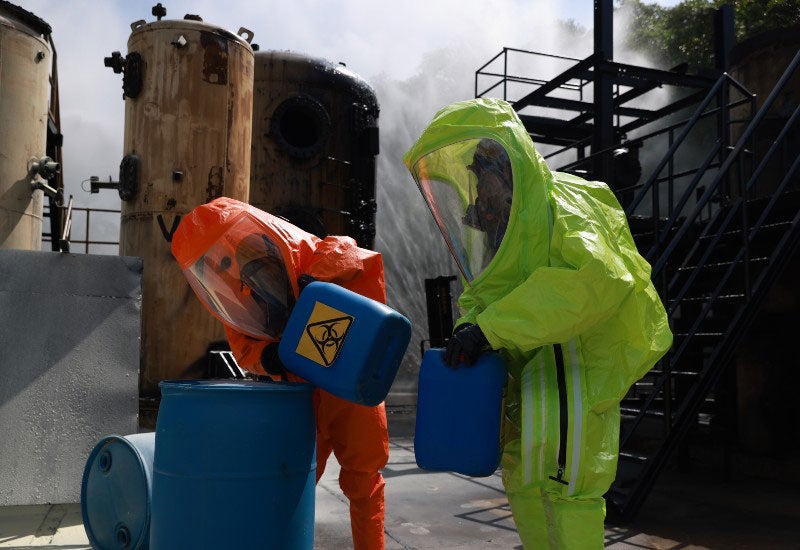
What Does Hazardous Waste Look Like?
Hazardous waste does not have a single look—its appearance varies widely depending on its type and source. Some hazardous wastes are visibly dangerous, like corrosive acids or highly flammable liquids. Others, like certain solvents or residues from industrial processes, may appear harmless but contain toxic components that require careful handling. It’s important to recognize that hazardous waste isn’t always overtly dangerous in appearance. For instance, a container of mixed radiological wastes or mixed hazardous waste has characteristics that might look similar to a standard chemical container, yet it possesses characteristics that make it much more dangerous.
Characteristics of Hazardous Waste
To manage hazardous waste effectively, it is crucial to understand its basic characteristics. Hazardous waste is typically identified by one or more of the following characteristics:
- Ignitability: This type of waste can easily catch fire. Examples include certain liquids with low flashpoints such as solvents and waste oils.
- Corrosivity: Corrosive wastes can destroy or damage other materials or living tissue due to their acidic or alkaline nature. Common examples include battery acids and industrial cleaning agents.
- Reactivity: Under normal conditions, reactive wastes are unstable and can cause explosions, toxic fumes, or other dangerous reactions when exposed to water, heat, or shock. For example, certain cyanides and sulfides fall under this category.
- Toxicity: This type of waste is harmful or fatal when ingested or absorbed. It can pollute the environment by leaching into groundwater. Examples include certain pesticides and heavy metals like lead or mercury.
These basic characteristics of hazardous waste are used to categorize and manage the waste properly. Any waste exhibiting one or more of these traits must be treated with care, ensuring that it does not harm people or the environment during storage, transport, or disposal.
Evaluating Hazardous Waste Characteristics
Evaluating hazardous waste characteristics involves identifying the specific dangers associated with the waste. This process typically requires chemical analysis, safety data review, and adherence to regulatory guidelines. Waste generators must conduct proper evaluations to categorize their waste accurately, ensuring that it meets all legal and safety standards. This evaluation not only helps in identifying the correct hazardous waste category but also in determining the most suitable disposal methods. Proper evaluation is crucial to prevent environmental contamination and ensure compliance with federal and state regulations.
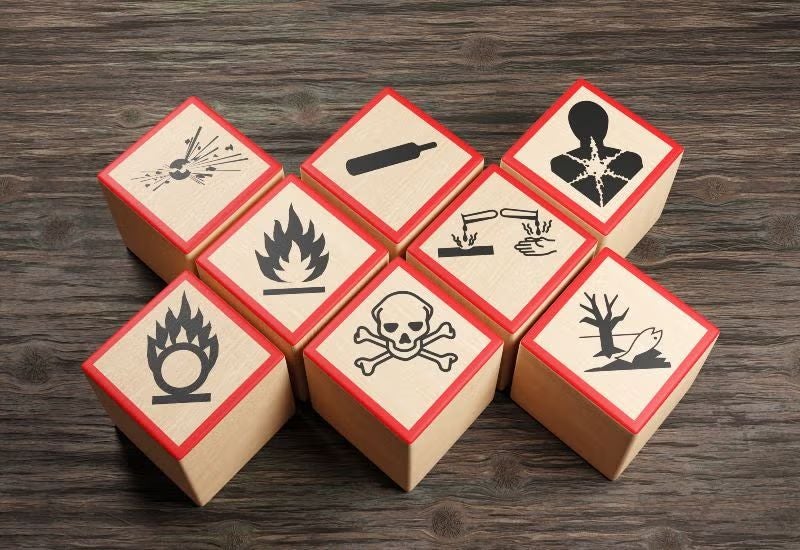
Why Choose Excel Industrial Group in Houston, TX?
When it comes to hazardous waste management, choosing a knowledgeable and experienced partner is essential. Excel Industrial Group in Houston, TX, brings over 25 years of expertise to the table, ensuring that your hazardous waste is handled with care and compliance. We specialize in managing all types of hazardous waste, including mixed hazardous and radiological wastes, providing safe, cost-effective solutions tailored to your needs. Our team understands the unique challenges of hazardous waste management and is committed to delivering efficient, environmentally responsible services.
Contact Us for All Your Hazardous Waste Solutions in Houston, TX
If you’re in need of professional hazardous waste management in Houston, TX, look no further. Excel Industrial Group is your trusted partner for comprehensive waste solutions. From evaluation to disposal, we handle every step with precision and care, ensuring your waste is managed according to the highest standards. Our expert team is here to provide you with tailored solutions for all your hazardous waste needs in Houston, TX. Don’t leave safety to chance—reach out now to speak with our professionals and secure the best waste management services available. Contact us today by filling out our contact form or calling us directly.
-
Hazardous Waste Disposal
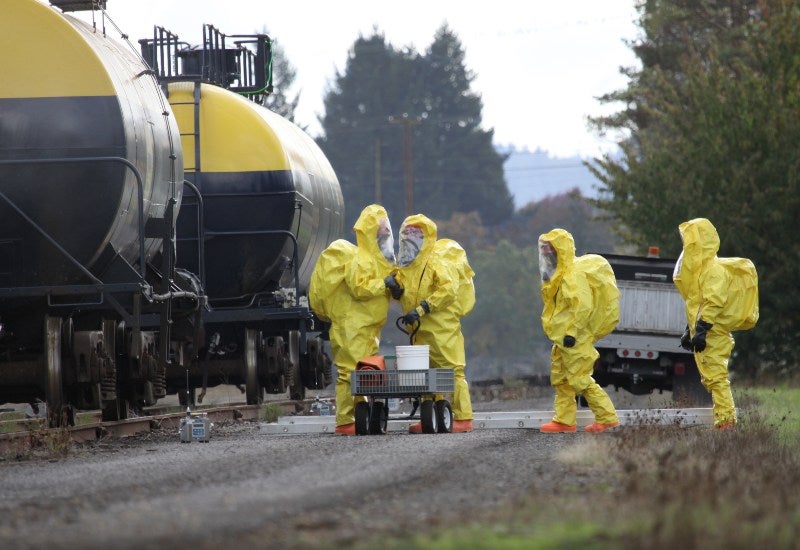
Safely Removing Hazardous Waste in Houston, TX
Do you work within an industry that produces mass amounts of hazardous waste every day? Is your facility struggling to find a solution for removing harmful waste in a safe and secure manner? If so, Excel Industrial group is here to help with hazardous waste disposal in Houston, TX. For over 20 years, our waste management professionals have given industries the tools, equipment, knowledge, and capabilities to properly transport and dispose of harmful materials the right way. Our services ensure that you, your team, and the environment remain safe and healthy. Contact us to learn more today.
What Is Hazardous Waste?
Hazardous waste material is a type of waste that has a detrimental, unhealthy, or potentially dangerous impact on humans, animals, and the environment. Hazard waste materials can be produced by many sources, including but not limited to industrial facilities and factories, processing plants, and disposed liquids, sludges, and gases.
The EPA classifies hazardous materials based on a complex set of rules. The material must be solid waste to be considered dangerous, and it must be determined if the material is excluded from regulations. Experts deem a material hazardous when it possesses a unique set of characteristics.
The Types of Hazardous Waste
Hazard materials are classified under four distinct lists by the EPA. The lists are as follows:
- F-List Waste: The F-list typically consists of waste from materials used in general such as household cleaning chemicals, degreasing chemicals, and solvents.
- K-List Waste: K-listed waste consists of hazardous materials produced from particular industries like petroleum processed by oil companies or manufactured pesticides.
- P-List Waste: The P-list includes unused materials or partially used materials such as pesticides that are discarded before full or partial usage.
- U-List Waste: The U-list comprises unused or partially used materials as well, such as medications and pharmaceutical products that are improperly discarded.
The Characteristics of Hazardous Waste
Hazard materials are classified as so depending on a few key characteristics. The characteristics are specific and may not apply to descriptions on product labels or safety warnings. They can be applied to used and unused waste materials.
Here are the main characteristics of hazardous material.
- Flammability: Does the material pose a fire risk? Can it quickly catch on fire or burn?
- Corrosion: Does the material consist of metals that will degrade, disintegrate or rush over time?
- Reactive Properties: Does the material have the potential to react unhealthily or dangerously with other elements?
- Toxic Properties: Does the material have any harmful traits or qualities that pose a threat to living things or the environment? Toxicity is a particularly complex character because not all toxicity levels are included in this classification.
What is Cradle to the Grave Waste Management?
The presence and threat of hazardous materials became a widespread public concern in the middle of the 20th century. This period saw a rise in solid waste without the means to dispose of it properly, which drew a mass outcry from the general population.
Though the issue of hazardous materials continues today, waste management and removal have seen significant innovation and enhanced capabilities since the middle of the last century. These developments include the cradle to the grave management program. Cradle to the Grave is the removal, transportation, treatment, and disposal of industrial waste material from the time it’s generated.
How is Hazardous Waste Removed?
Before removal, a material must be determined to be a hazard according to the classifying characteristics. Assessment is completed through detailed documentation and following of rules and regulations.
After the material is deemed hazardous, a hazardous waste removal services company takes care of the rest. The waste removal service carefully takes away waste from the generator and transports it to a waste disposal center. The transporters are safe for use and regulated by the EPA.
Once the waste arrives at the waste center, it is housed in either a temporary or permanent storage facility. The storage space prevents waste materials from leaking and protects them from encountering other waste materials. People and the environment are protected through proper storage.
Waste can be recycled depending on its properties. Waste recycling can provide many advantages including a cut-down in producing more raw materials, which means less waste within the environment. If a waste material cannot be recycled, it is then treated in other ways in a Treatment Storage and Disposal Facility (TSDF).
A quality TSDF adheres to strict regulations and standards that protect soil, water, air, and people from contamination.
Give Us a Call
Are you an industrial facility with harmful or damaging waste? Do you need to remove and process your waste safely and efficiently? If so, please feel free to fill out the contact form below or contact us today and speak with a member of our team. We’re a knowledgeable and dependable group that will complete your waste processing while following regulations from beginning to end.
-
How Companies Can Reduce & Recycle for America Recycles Day
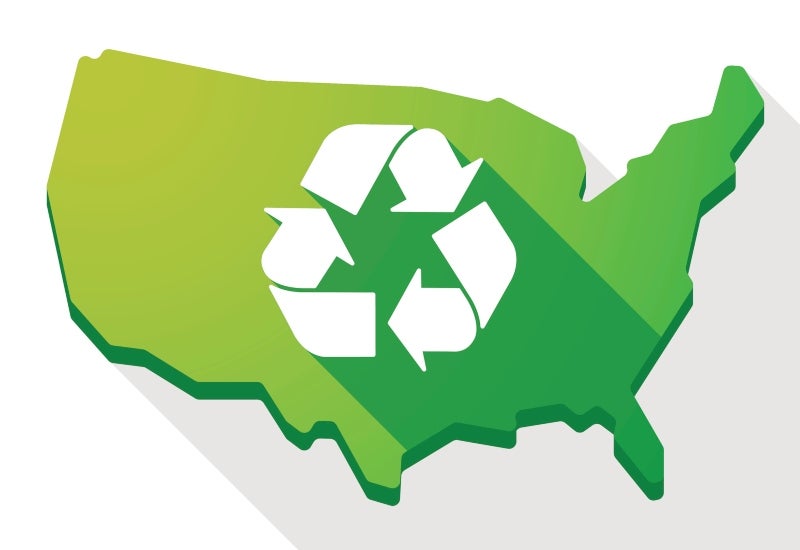
Industrial Recycling Management in Houston, TX
If your business has been looking for ways to become greener and more responsible, America Recycles Day is the perfect time. The industrial recycling specialists at Excel Industrial Group in Houston, TX celebrates America Recycles Day on November 15. The day is championed by the EPA to recognize the importance and impact of recycling. While recycling rates have come a long way over the years, we still have a long way to go. Back in 1960, less than 7% of waste was recycled, compared to almost a third of all waste today. Recycling and reuse accounts for more than 600,000 jobs in the United States. Companies across all industries can use America Recycles Day as a kick-off date to focus on recycling and reducing waste. Our team can help you create a commercial recycling or industrial chemical recycling plan, and we offer full-service waste disposal services. Learn more about America Recycles Day and get in touch with us for an estimate.
The Benefits of Recycling
While every American can benefit from recycling, businesses have an increased responsibility to do their part. Check out the following benefits of recycling:
- Reducing the amount of waste sent to incinerators and landfills
- Increasing economic security by using domestic materials
- Conserving natural resources, including water, timber, and minerals
- Preventing pollution by reducing the need to collect new, raw materials
- Supporting American manufacturing while preserving valuable resources
- Saving energy
- Helping create new jobs
How to Reduce & Recycle
While America Recycles Day is a great reminder to learn how to reduce and recycle industrial and chemical waste, your business should be doing so 365 days a year. The easiest way to do your part is to generate less waste. This may sound challenging, and it certainly can be. While you may only be able to reduce your waste by a small amount, the rest can be disposed of properly by practicing recycling when applicable. Many types of waste can be recycled, including paper, glass, plastic, mixed organics, and more. Your company can at least explore your options to celebrate America Recycles Day. The team at Excel Industrial Group is here to help you create a plan to reduce waste and recycle more.
About America Recycles Day
America Recycles Day dates back to 1997. The day was started by the National Recycling Coalition and has been managed by the Keep America Beautiful organization since 2009. Thousands of events are held across the country on November 15. The goal of America Recycles Day is to educate Americans on the importance of recycling. Excel Industrial Group encourages your business to participate in America Recycles Day this year and to find ways to reduce your waste while recycling as much as possible.
Request Your Industrial Recycling Quote
Our industrial waste specialists are here to help you manage your waste and find ways to reduce and recycle. We offer full-service waste management services for companies in Houston, TX. Contact us today to find out more and get your quote for our services.
